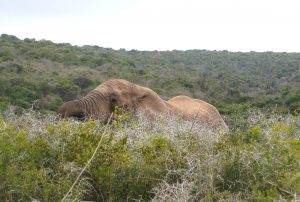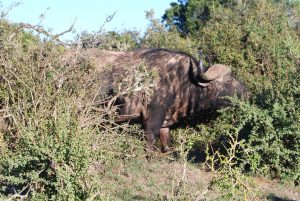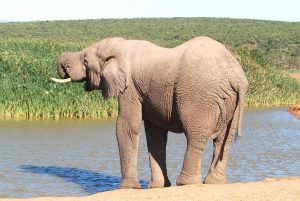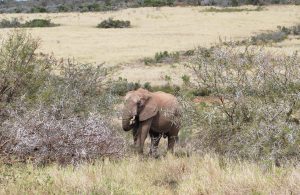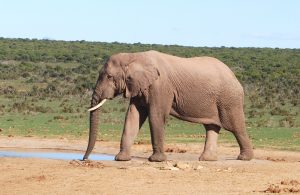 In < my estimation there is no experience on Earth like meeting an elephant in the wild. I don't mean coming face-to-face with an elephant while on foot (heaven forbid!!), but encountering one from the safe distance of a vehicle. Then again, the safety offered by a vehicle with an elephant in the vicinity is illusory, for while elephants are on the whole placid animals, they can be playfully destructive and even ferociously aggressive when on the rampage! I learnt this many years ago when holidaying as a little girl with my parents in the Wankie Game Reserve in then-Rhodesia.
Like many other days of that memorable holiday, we were on a typical game-viewing drive when a herd of elephants crossed the dust road in front of us. My father waited until all the elephants had made their crossing, and then quietly pulled off. We had only gone a short distance when we suddenly heard the ear-splitting trumpeting of a thoroughly irate bull elephant that had come out from the bush behind us. As the elephant gathered pace my father accelerated, and I will never forget the terrifying spectacle of that giant pachyderm in the rear window, its trunk waving and its ears flapping in outraged anger as it tried to run us down. Fortunately that frightening experience has done little to dampen my enthusiasm for elephants, and while I am greatly respectful of their right of way, I am also incredibly awed by their sheer size and spectacle.
In < my estimation there is no experience on Earth like meeting an elephant in the wild. I don't mean coming face-to-face with an elephant while on foot (heaven forbid!!), but encountering one from the safe distance of a vehicle. Then again, the safety offered by a vehicle with an elephant in the vicinity is illusory, for while elephants are on the whole placid animals, they can be playfully destructive and even ferociously aggressive when on the rampage! I learnt this many years ago when holidaying as a little girl with my parents in the Wankie Game Reserve in then-Rhodesia.
Like many other days of that memorable holiday, we were on a typical game-viewing drive when a herd of elephants crossed the dust road in front of us. My father waited until all the elephants had made their crossing, and then quietly pulled off. We had only gone a short distance when we suddenly heard the ear-splitting trumpeting of a thoroughly irate bull elephant that had come out from the bush behind us. As the elephant gathered pace my father accelerated, and I will never forget the terrifying spectacle of that giant pachyderm in the rear window, its trunk waving and its ears flapping in outraged anger as it tried to run us down. Fortunately that frightening experience has done little to dampen my enthusiasm for elephants, and while I am greatly respectful of their right of way, I am also incredibly awed by their sheer size and spectacle.
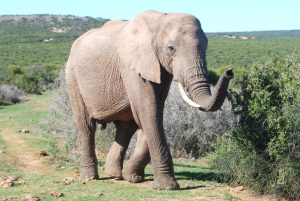 For me to see an elephant in the wild is to glimpse a primeval world. They are the embodiment of an ancient African continent I feel in my soul. The aeons of their existence are measured in the wrinkles of their leathery grey skin, the maps of their great ears and the patience in their eyes. I have a sense that they are amazingly sentient beings with a wisdom and intelligence beyond what I can imagine, and perhaps beyond my own.
For me to see an elephant in the wild is to glimpse a primeval world. They are the embodiment of an ancient African continent I feel in my soul. The aeons of their existence are measured in the wrinkles of their leathery grey skin, the maps of their great ears and the patience in their eyes. I have a sense that they are amazingly sentient beings with a wisdom and intelligence beyond what I can imagine, and perhaps beyond my own.
Elephants can move through the bushveld without so much as a snap of a twig, and they are often so well camouflaged that despite their great size, they are invisible. Yet their benign presence allows them to own the African savanna in a way that few animals do. What a thrill and a privilege then to experience elephants in the wild!
